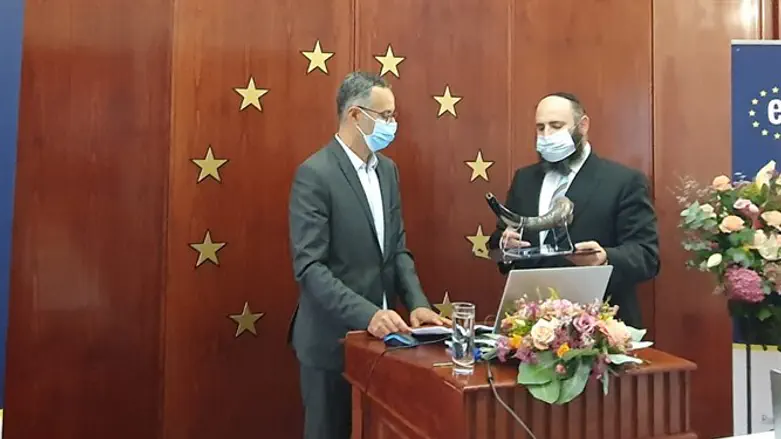
Dozens of Jewish communities and organizations from across the continent, along with members of the European Commision and parliament, participated on Monday in a special meeting initiated by Rabbi Menachem Margolin, chairman of the EJA.
The special debate took place against a backdrop of a sharp rise in anti-Semitism across the continent and attempts by legislators in parliaments in various countries to drive a coach and horses through the EU enshrined principle of freedom of religion by banning the observance of Jewish customs such as kosher slaughter and circumcision.
At the conclusion of the conference, the Jewish leaders hosted a ‘socially distanced’ cocktail in honor of the New Year held at EJA headquarters with the participation of European Commision Vice President Margaritas Shinas who is incharge of fighting Anti-Semitism, European Parliament Vice-President Nicola Beer, European Commission Coordinator on combating Antisemitism, Katharina von Schnurbein.President of the Forum of Jewish Organizations of Belgium, Regina Suchowolski Sluzny, board membersof the Jewish community in Düsseldorf Ron Ronen in charge of security for German Jewish communities throughout Germany and more.
Special guest via Zoom from Israel, Diaspora Minister Omer Yankelevich noted that: "Denying the principle of Jewish freedom of religion means denying Jews the ability to live in Europe. We will continue to expand our activities in order to strengthen Jewish identity throughout Europe through investment in Jewish schools, development of programs and informal activities for different age groups, support for communities and strengthening their community resilience. "
Rabbi Menachem Margolin warned the participants that: "Attempts to prevent Jewish slaughter and circumcision are not really for the sake of protecting the child or the animals. This legislation should be called out for what it is- it is antisemitic legislation! Initiatives that attempt restrict the religious freedom of Jews across Europe are not on hold because of Corona or the economic crisis."
"We cannot afford to take our eye off the ball as it could roll over into other European countries and affect hundreds of thousands of Jews. "
The secretary general of the European People's Party (EPP), Antonio Lopez-Isturiz White, called for action to advance the fight against anti-Semitism across the continent, noting that: "Israel's peace agreements with the UAE and Bahrain are a golden opportunity to show Europeans the real and beautiful face of Israel - a face that unfortunately many Europeans have (sometimes deliberately) avoided seeing to this day. "
The European Commissioner for Regional Development (whose office is responsible for co-operation agreements between Israel and the European Union) Oliver Várhelyi joined White's call, noting that: "Unfortunately we are seeing a rise of new anti-Semitism across the continent becoming increasingly violent. Israel is without a doubt the EU in the Middle East and is an island of stability in the region. Along with a wide variety of successful cooperations between Israel and the European Union in the fields of science, trade, culture, etc., we must work to strengthen cooperation on political to political levels as well. "
President of the Consistoire of the Jewish Communities in France Joel Mergui: “Times have changed but the problems and threats against the Jews of Europe have remained the same. We must unite all over Europe to ensure that Jews feel welcome here and do not leave. We can do this in three ways: to respect the memory of the Holocaust and learn its lessons, strengthen the understanding and support of Israel's importance to European Jewry and defend the principle of religious freedom. European Governments must support Jewish communites that are suffering financialy to to the Covid-19 situation in the same ways they are supporting byusness. The importance of synaguges to jews justifys it”
Belgian MP Michael Freilich updated those present on his efforts to repeal legislation banning circumcision in the country and even said he was working to promote pan-European legislation that would prevent the enactment of laws restricting religious freedom in EU countries. Freilich also informed those present that after the signing of the peace agreement between Israel and the United Arab Emirates, he began cooperating with the UAE ambassador to Belgium in order to prevent the enactment of a law that is known to harm Muslims as well. On that occasion, Freilich informed the Jewish leaders that the Belgian parliament would soon vote on his bill, which would also define Hezbollah's political arm as a terrorist organization.
Saskia Pantel, president of the Zionist Federation of Sweden, said that during Yom Kippur, Swedish Jews were targetted for a coordinated series of antisemitic attacks that included sending posters and letters to private homes and institutions, including antisemitic blood libels accusing Jews of pedophilia, misogyny and animal abuse.
The Head of the European Union’s security, director Lauren Moshel, emphasized that although the security of the Jewish communities is under the responsibility of the various European countries, the responsibility for their security also falls on the EU institutions. The governor also noted that he supported Rabbi Margolin's proposal to establish a unified pan-European security center that would monitor security cameras from all over the continent and coordinate the defense and prevention policies of Jewish institutions between the security forces and the Jewish communities.
Eduard Odoner, a board member of the Association of Jewish Communities in Poland (TSKZ), updated during the hearing that the law banning the export of kosher slaughter from Poland is expected to return to the lower house of parliament and be accepted there verbally and without reservation. This situation, Odonor warned, would affect the Jewish way of life of hundreds of other communities across the continent, as about 40% of kosher meat in Poland is destined for export.”